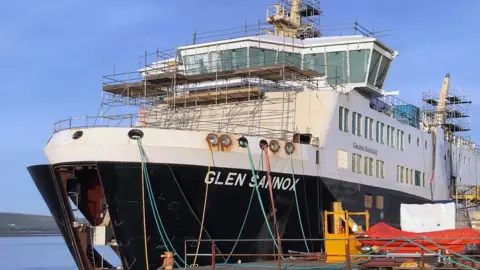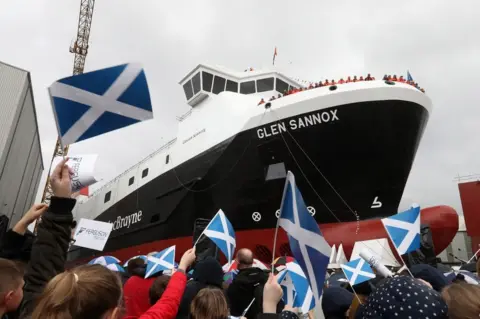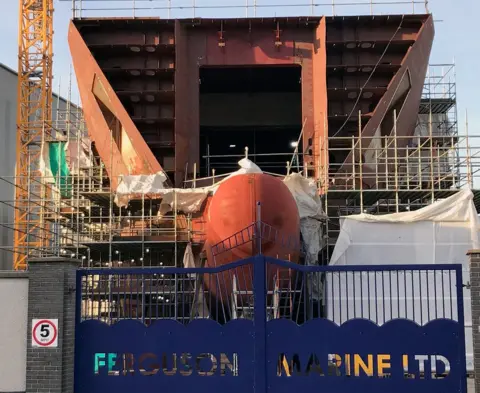Ferguson ferries deal awarded without financial safeguards
 BBC
BBCThe contract for two delayed and overbudget CalMac ferries was approved by ministers without normal financial safeguards, a watchdog has found.
An Audit Scotland investigation was unable to establish why the £97m order was given to Ferguson shipyard without such guarantees.
The ships, still being built at the Port Glasgow yard, will be five years late and could cost more than £250m.
Problems have also continued since the yard was nationalised, the report said.
The Audit Scotland report revealed that as recently as January there were still 175 technical, safety or quality issues be resolved - including some that could prevent the issuing of a passenger safety certificate by regulators.
On Wednesday, MSPs were informed of the latest delays to the project, which arose after it was discovered cables installed in one hull were too short to reach equipment.
The ships will not be ready to go to sea until 2023, while total costs have increased by up to £12m - on top of the £240m estimate given by Audit Scotland previously.
Finance Secretary Kate Forbes also warned MSPs there was possibility that new problems may emerge during the commissioning process, although she insisted the ships would be completed.
How the saga has unfolded
In August 2014 Ferguson's, the last commercial shipyard on the Clyde, went into administration, threatening 70 skilled jobs in one of the most deprived areas of Scotland.
Then first minister, Alex Salmond, personally intervened to save the yard. He persuaded billionaire businessman Jim McColl, a member of his council of economic advisers, to take it over just a week before the Scottish independence referendum.
A year later the new company Ferguson Marine Engineering Ltd (FMEL) was announced as preferred bidder to build two new ships for the state-owned ferry network CalMac.
Ferguson's bid was the most expensive of the six yards that tendered but outscored them on "quality".
 PA Media
PA MediaThe signing of the £97m fixed price contract was announced in October to applause on the opening day of the SNP conference in Aberdeen.
The first steel was cut a month later but within weeks the timetable for the build was starting to slip.
Problems worsened over the coming years, with FMEL accusing CMAL, the government agency which owns and procures ships for CalMac, of repeated specification changes.
CMAL denied this, accusing FMEL of rushing ahead with construction before finalising the design.
By early 2019 relations between them had broken down, the ships were hugely delayed and overbudget and FMEL was running out of money, despite receiving £45m of loans from the Scottish government.
In August that year the firm, by now employing more than 300 people, went back into administration.
The shipyard was later nationalised by the Scottish government, and the turnaround director appointed to supervise completion of the ships estimated it would require an extra £110m-£114m of public money.
The first ship Glen Sannox was due to be delivered this summer but on Wednesday a further eight-month delay was confirmed.
The report's findings
One of the key findings of the Audit Scotland investigation is that there were inadequate financial safeguards in place to protect public money.
Shortly after being named as preferred bidder, FMEL notified CMAL it could not provide the full Builder's Refund Guarantee (BRG) - which was stipulated in the contract. This would have provided full repayment guarantees if the ships were late, failed to meet specification or if the shipbuilder went bust.
A compromise was negotiated but CMAL's chairman remained so concerned he wrote to Transport Scotland suggesting the contract should not be given to FMEL, and the procurement process restarted.
Transport Scotland told him ministers were aware of the risks and were happy to proceed.
"There is no documented evidence to confirm why Scottish ministers were willing to accept the risks of awarding the contract to FMEL, despite CMAL's concerns," the report says.
 PA Media
PA MediaGovernment agency CMAL soon became aware of many problems, but the terms of the contract gave them no power to "direct" FMEL to make changes, the watchdog found.
Money was to be released to FMEL upon hitting certain "milestones" but these were vague and failed to stipulate quality, meaning there was a legal obligation to hand over more funds.
"FMEL was able to claim fabrication milestones for vessel parts that were not erected on to the vessel, that had not been surveyed and, in some cases, had been left unused in the shipyard for several years," the report found.
The launch of Glen Sannox by First Minister Nicola Sturgeon in November 2017 triggered one such payment, but most of the machinery and pipework normally fitted by this stage had yet to be installed.
The report also says that £45m of government loans to FMEL - now mostly written off - were deemed commercially sensitive, meaning the Scottish Parliament and CMAL were only told about them months later, yet they did little to advance construction of the ships.

While noting that relations between the shipyard's new management and CMAL have improved greatly since nationalisation, the report says serious issues remain.
The breakdown of relations with FMEL meant the government did not have full information when it took over.
"The Scottish government made the decision to nationalise the shipyard without a full and detailed understanding of the amount of work required to complete the vessels, the likely costs, or the significant operational challenges at the shipyard," the report says.
CMAL still has concerns about work quality and the detail of plans. In January this year there were still 175 outstanding Owner Observation Reports (OORs) - technical, safety or quality concerns.
Some of these, such as the accessibility of equipment for inspection and maintenance, will need to be remedied before the ship is granted a passenger safety certificate.
The board appointed by ministers to oversee the shipyard says there is a risk that CMAL could refuse to accept the ships if some of these issues are not resolved.
The Covid pandemic and recruitment issues has affected work, and workforce morale is said to be low.
A serious problem with cabling installed on Glen Sannox prior to nationalisation was only identified in February and there is a warning that more "legacy" problems may yet emerge.


This is easily one of the biggest public procurement disasters in the short history of devolution.
Yes, the runaway costs of the construction of the Scottish Parliament were greater but this looks like a Holyrood-on-sea.
We know the ferries will be at least four years overdue and - at a cost of £240m so far - at least two and a half times over budget. But that's not the final bill.
The report notes that "significant remedial work is still ongoing" and crucially "continues to be uncovered" with likely impacts on budget and delay.
At the heart of this saga, there is a key question which the watchdog has been unable to answer.
Why did ministers decide to award this ferry building contract to Ferguson against the advice of its own ferry company, CMAL which judged that there were "too many risks involved"?

The political reaction
The Scottish Conservatives described the report as "absolutely damning".
Transport spokesman Graham Simpson said: "Ministers have presided over an embarrassing fiasco year after year and it is our island communities who have been left abandoned.
"They have faced endless delays on the arrival of new ferries and seen costs spiral out of control, with one expert saying this week the cost of the two new ferries could now hit £400m."
Scottish Labour's Neil Bibby said blame lay with the SNP government. "Their relentless incompetence has left island communities waiting years for new lifeline ferries, taxpayers picking up an ever-growing bill, and Scottish shipyard workers fixing problems they didn't create."
The Liberal Democrats described it as an example of "failed SNP industrial intervention policy".
Economy Secretary Kate Forbes, however, insisted many problems lay with decisions taken by FMEL, and she defended the nationalisation of the shipyard.
"Not only did our efforts save the last commercial shipyard on the Clyde from closure, we directly rescued more than 300 jobs and ensured that the two vessels - which are vital for our island communities - will be delivered," she said.
She said the procurement process for the ships was undertaken in good faith and with due diligence, and added: "Suggestions to the contrary are wrong."
